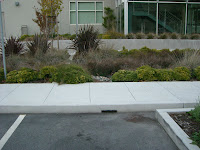
















Webcast on Thursday, December 9, 2010
"Designing LID to Work: Lessons Learned from North Carolina"
by Dwane Jones, Extension Associate, North Carolina State University, Cooperative Extension and Heather Burkert, RLA, LEEP-AP, H. Burkert & Co., Landscape Architect
Register at: www.epa.gov/watershedwebcasts
Join us for the webcast “Designing LID to Work: Lessons Learned from North Carolina.” North Carolina is a geographically diverse state spanning mountain, piedmont and coastal regions, making its low impact development (LID) implementation progress a model for many states across the country. North Carolina State University is a national leader in the study of LID and has advanced LID research and implementation, including the development of the state’s LID guidance, the “North Carolina LID Guidebook.” The NC State Cooperative Extension’s LID certification program also has the potential to be replicated nationally. This webcast will feature a discussion of barriers to LID implementation and the progress that is being made to address them from a “boots on the ground” perspective of the NC State Cooperative Extension, as well as a landscape architect who is making LID a reality. Webcast participants are eligible to receive a certificate for their attendance. The webcast presentation is posted in advance at www.epa.gov/watershedwebcasts and participants are encouraged to download it prior to the webcast.
As of Oct, residential contractors are required to obtain 16 continuing education credits per year. Commercial contractors have already had continuing education credits for some time.
Registration is now open for the following classes that fulfill the requirements for either residential or commercial contractors and may interest other low impact development practitioners (public works staff; landscape architects, designers, and contractors; planners; architects; engineers; natural resource managers; builders; developers):
➤ Sustainable Site Planning
This course serves as an upper level in-depth study of site planning so that contractors can apply best management practices to improve the short and long-term sustainability of new and remodeled sites. Students will get immediate hands-on experience in applying the learning outcomes. This course fulfills the CCB’s requirement for two hours of Sustainable Building Practices, plus one elective hour. Jan. 26, 1 - 4 p.m. , $149
➤ Best Practices for Sustainable Sites Under Construction
This course serves as an upper level in-depth study of how contractors can apply best management practices to protect natural resources. The important of sediment prevention and erosion control as well as limiting disturbance during construction will be emphasized. This course fulfills the CCB’s requirement for two hours of Sustainable Building Practices. Jan. 27, 10 a.m. - Noon, $99
➤ Site Strategies for Energy & Fuel Efficiency
(Included on this listserv because it deals with vegetation, pavements, and roofs, which are all part of the stormwater infrastructure system, but we’ll be looking at them through the lens of how they affect energy demand and fuel consumption.) This course serves as an upper level in-depth study of best management practices that can reduce demand for energy inside and outside the building through sustainable landscape design, construction and operations and maintenance. This course fulfills the CCB’s requirement for two hours of Sustainable Building Practices. Feb. 2, 10 a.m. - Noon, $99
➤ Rain Gardens 201 Technical Field
Learn how the sum of the parts (inlets, outlets, check dams, etc.) in a variety of vegetated stormwater facilities (rain gardens, bioswales, infiltration basins, green streets, planters) can be designed, constructed and maintained to improve or impact the watersheds in which we build them. This course fulfills the CCB’s requirement for two hours of Sustainable Building Practices, plus three elective hours. Feb. 16, 10 a.m. - 3 p.m. , $249
Visit mhcc.edu/training for more information.
Call 503 491-7235 to reserve your space now.









